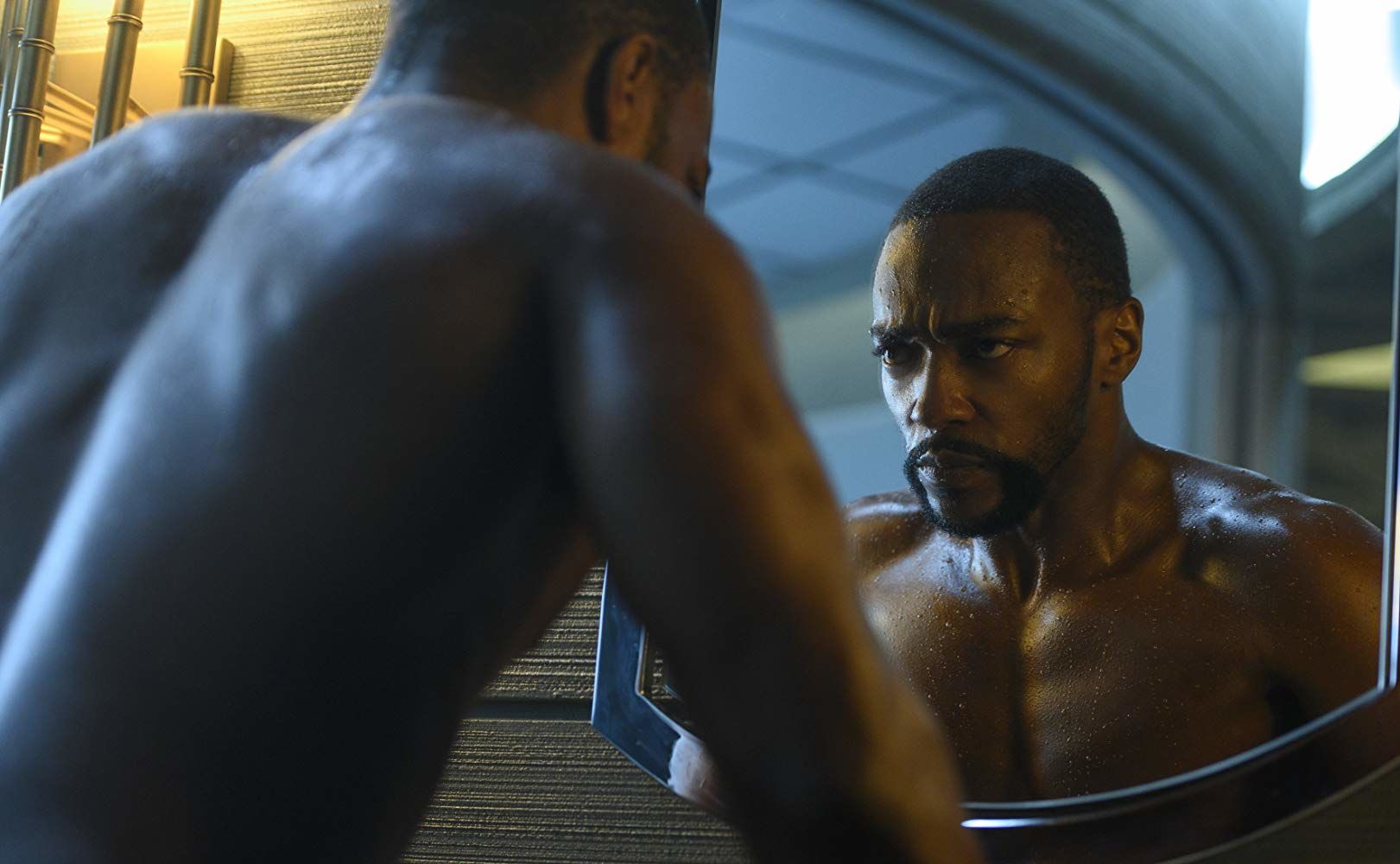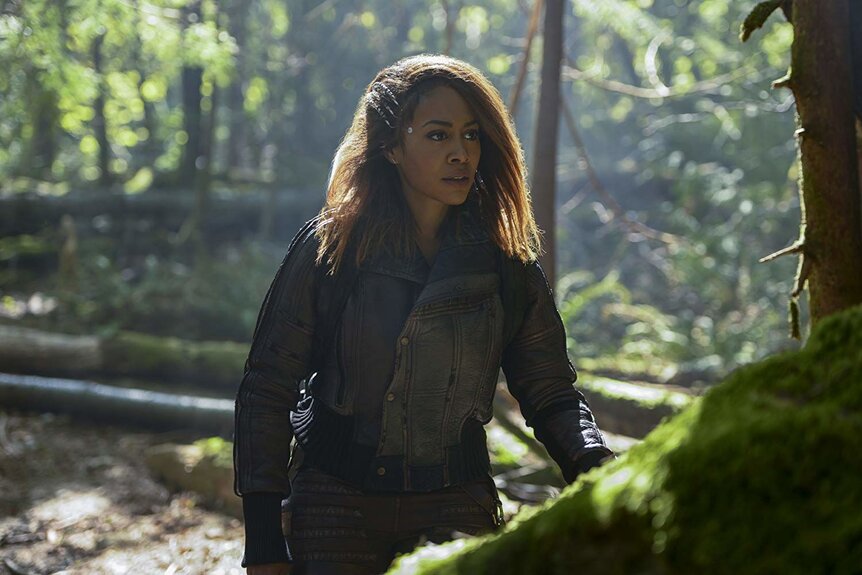Create a free profile to get unlimited access to exclusive videos, sweepstakes, and more!
The cast of Altered Carbon Season 2 on race, gender fluidity, and listening to Tupac

One of Anthony Mackie's must-watch shows growing up was the classic '90s series Quantum Leap. He loved how Scott Bakula's character Dr. Sam Beckett would leap into new bodies and experience what it was like to be female, to be black, to be disabled, even to be a chimpanzee. Mackie's favorite episode was "8 ½ Months," when Sam leaped into the body of a pregnant woman in labor. "Seeing this man about to give birth and his reaction to that? That's the ultimate path of an actor," Mackie told SYFY WIRE. "Being put in that position and making it realistic and honest."
That's why Mackie got excited when he read the scripts for the new season of Altered Carbon and realized that his character, Takeshi Kovacs, was going to spend some time wearing the sleeve (or inhabiting the body) of a female lounge singer on Maghda Prime — even if it meant he wouldn't get to do the scene himself. (South Korean singer/actress Jihae Kim does the honors.) "I'd love the opportunity to do something someday where I play a guy who is outwardly a guy but seen as a woman," Mackie says. "That would be fun. But I love that this guy is a woman."
The transhumanist world of Altered Carbon is a potential playground for these sorts of existential mash-ups thanks to the show's in-world cortical stacks, which allow human consciousness to be preserved, duplicated, and transferred. Characters can body-hop and live as any identity, any race, any gender across time and space. With enough money, your physical form can be cloned for remote backups, and/or customized and augmented with tech upgrades.
This deals with interesting questions about how people are perceived and treated in this 25th century future, especially our main character, who cycles between Asian, white, and black bodies (portrayed by Will Yun Lee, Joel Kinnaman, and Mackie).
"Tak isn't reacting to race," Showrunner Alison Schapker says. "He's not carrying around any sort of internalized racism. He's not carrying around a mindset that he's going to react to that. And the fluidity of that is exciting. But has racism disappeared? I don't imagine that it has. And I don't imagine sexism has disappeared, either. But it's subtle."
Actress Simone Missick likens this to a passage in Claudia Rankine's poetry collection, Citizen: An American Lyric. "She talks about how subtle racism can be like the rain," Missick explains. "You can sometimes see it, but you might have to squint your eyes. And you can feel it, even if it's not always visible. That's how it feels in the world of Altered Carbon." Adds Mackie, "I don't think racism and sexism will ever truly go away or be banished. But I think the ideas of race and gender are not so much in question."
Take, for instance, Missick's bounty-hunter character Trepp, who is happily married to her wife Myka. In our world, they might identify as lesbian. But in the show's time and place, would they even consider their sexual preferences part of their identity? Would it matter if Trepp, in the course of her dangerous line of work, damaged her birth body and was forced to cross-sleeve, given limited finances and available inventory? Partners are sometimes assigned new sleeves of different genders, something Vernon and Ava Elliot unwillingly experienced in Season 1. Trepp and Myka were "very lucky" they were able to pick a new sleeve of the same age and gender for their son. It cost them quite a bit just to rent, "but it's still not their child as they knew him before his accident," Missick notes.
Other less fortunate families may find that their murdered children come back to them all grown-up. This happened to a seven-year-old who was given the body of a middle-aged woman, also in Season 1. "There is something so heartbreaking about that," Missick says, because it drove home the horror of being forced into a body that doesn't feel like it belongs to you, that you're not prepared to occupy, while simultaneously being confronted with societal expectations that you and your body are a natural match.
The show also considered the proposition that our bodies still have meaning, even if our consciousness is disembodied. Can we really transcend our bodies? Does self-identity extend beyond race to ethnic communities? Do gender and sexuality binaries completely disappear when tech enables such fluidity that you can reassign your race, your gender, your age, your physical abilities? For that matter, does or should the institution of marriage change when "forever" is actually on the table?
"All love is love," Missick says. "Trepp and Myka have a love that transcends sleeves, that transcends bodies. Trepp would do anything to be with Myka, and if she were sleeved as a male, it wouldn't change their dynamic. I just don't know what they would call it." Still, Missick concedes, "it would be an adjustment."
Theorizing aside, this body-hopping is prohibitively expensive and priced out of the financial range for everyday people. And so the real problem for most of the people in Altered Carbon is economics. "It's strictly a class society, much like our society today," Mackie says. "Tupac once said something I thought was brilliant about trying to gain access to power. He said, 'I tried to see if it was a white thing. But everywhere I go with money, they let me in, and everywhere I go with none, they don't. Trust me, that's all it is.'"
Actress Renée Elise Goldsberry agrees. "I believe that's the real issue," she says. "That race, gender, sexuality are all thrown out there to get poor people to fight with each other. The real question is, who is controlling the resources? Because the only thing that checked the wealthy before was that they would eventually get sick and die. But now they're just hoarding everything forever. The biggest issue is greed."
Most of the functionally immortal, incredibly wealthy characters called "Meths" in Altered Carbon are white men, Missick points out. But she also feels that classism is the main issue in this world and ours, preventing even things like advances in health care from being affordable. "The stark contrast between the haves and have-nots? We are now living in an almost Altered Carbon kind of existence. And hopefully, the audience will start to look at this and go, 'This is what we're heading towards.'"















